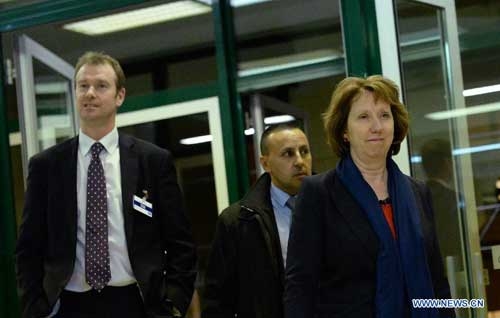New round of Iran nuclear talks resumes in Geneva
 EU High Representative for Foreign Affairs and
Security Policy Catherine Ashton (R) arrives at the Palace of Nations, the
venue hosting talks on Iranian nuclear program, in Geneva, Switzerland, Nov.
20, 2013.The date was set during the last round of talks between
the P5+1, Britain, China, France, Russia and the United States plus Germany, and Iran.
EU High Representative for Foreign Affairs and
Security Policy Catherine Ashton (R) arrives at the Palace of Nations, the
venue hosting talks on Iranian nuclear program, in Geneva, Switzerland, Nov.
20, 2013.The date was set during the last round of talks between
the P5+1, Britain, China, France, Russia and the United States plus Germany, and Iran.
The P5+1 group is represented by the EU High Representative for Foreign Affairs and Security Policy Catherine Ashton and the Iranian delegation is headed by Foreign Minister Mohammad Javad-Zarif.
The day started with a series of closed-door bilateral meetings, and delegates of the six world powers met before the bilateral meeting between Ashton and Zarif in the afternoon.
In the evening, the plenary session with delegates of six powers and Iran present was held at the Palace of Nations, followed by another series of meetings in bilateral format.
Chinese Vice Foreign Minister Li Baodong, who headed the Chinese delegation to the talks, said the last round of talks laid foundation for Wednesday's negotiations. He said China hoped that all parties could reach an agreement and achieve progress at the new round of talks.
It is reported that world powers will seek to reach a "first-step" agreement to break up the long deadlock over Iran's nuclear program.
The new round of talks starting from Wednesday is the third negotiations between Iran and the six powers in more than a month.
In the last round of talks, which began on Nov. 7 and extended to an unscheduled third day filled with ministerial-level meetings, the two sides failed to nail down an interim deal as expected.
After the last round of talks, Ashton said that "a lot of concrete progress have been achieved, but some differences remain," and Zarif hoped that an agreement could be reached this week.
In a different and separate development, Iran and the International Atomic Energy Agency (IAEA) signed a cooperation deal on Nov. 11 to allow the UN nuclear watchdog access to more Iranian nuclear facilities for inspections, including the Arak heavy water plant and Gachin yellow cake mine.
Western countries have long been accusing Iran of developing nuclear weapons under the cover of a civilian nuclear program, but Iran insists that its nuclear program is for peaceful purposes.
Xinhuanet

